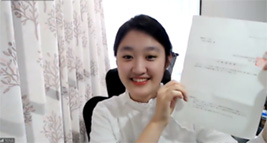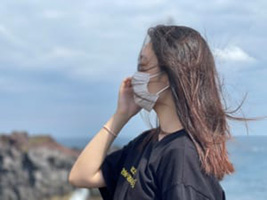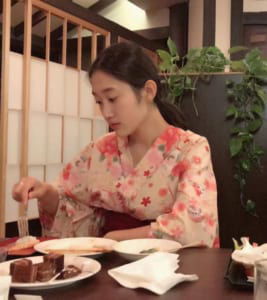Student Interview with Tong Xiaoqing
- Home
- School Life
- Student Interview
- Student Interview with Tong Xiaoqing
Tong Xiaoqing
From China
Kyoto Campus / Advanced III-4
Kyoto University Graduate School
Department of Advanced Mathematical Sciences Passed
- Please introduce yourself.
- My name is Tong Xiaoqing. I am from the Software Department of Dalian University of Technology in China. Due to the 2+2 dual degree program partnership between Dalian University of Technology and Ritsumeikan University in Japan, I took the latter two years of my undergraduate studies at the School of Information Science and Technology, Ritsumeikan University. After that, I have completed my language studies at ISI Kyoto and will now enter graduate school at Kyoto University.
- Can you tell us about your experience studying in Japan?
- I had Japanese language classes in my first and second year of undergraduate school, and by the time I arrived in Japan, I was roughly at N2 level. However, when I entered an environment where I was learning with Japanese people for the first time, I could not understand the classes well, so I listened to recordings after class and reviewed them further on my own.
I really like the sensitive and free research atmosphere in Japan. My laboratory is small with 6 or 7 members, but we have many seminars and professors are interested in our thesis progress. I find it attractive that Japanese researchers are not dependent on achieving a quota for the number of papers, and can devote their energy to the research they like.
I was studying brain science and needed to record brain activity in experimental subjects. Ritsumeikan University is indeed a prestigious private school and has a lot of fine experimental equipment, which was useful for my research. - Were there any difficulties in applying to Kyoto University Graduate School?
- The written math exam was the most difficult. The content included calculus, linear algebra, and complex analysis, but it was more difficult than I expected.
Since there are not many senior Chinese students in my major, I studied past questions previously answered by senior Japanese students. - How was your study experience at the Kyoto School?
- The teachers at ISI Kyoto cared about my exams and my health. Classes, homework and extracurricular activities are well designed. I am very impressed with the school bingo game we had at Christmas time.
- What are your future plans?
- I have not yet decided whether I will go on to a doctoral program in the future, but if I go out into the world, I think I will work in an informatics-related job. Whether it is development, planning, or algorithms, I don't think I will leave the software field. (Goal: Annual income of 10 million yen for new graduates)
Ideally, after graduate school, I would like to work for a foreign company in Japan for two to three years and then return to China. - Please give a message to junior students in science and engineering who are considering studying in Japan.
- For students of science and engineering, the first step in pursuing higher education abroad is to clearly define attainable goals. It is important to set goals after determining the field and research that are truly suited to you, rather than being swayed by the industry boom of the moment.
Using my major as an example, it is becoming increasingly saturated. Many people study machine learning and deep learning boom, but I also see people who try to study it, but it does not suit them and they do not continue to the end. I think it is important to properly analyze yourself, your research topic, and your research industry, and then systematically decide on your area of study and research.




